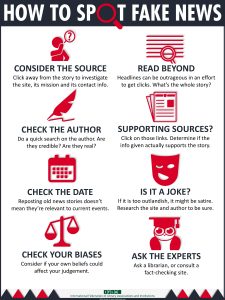 It’s a post-truth world out there (Oxford Dictionaries’ 2016 word of the year). And your librarians will help you tell truth from fiction.
It’s a post-truth world out there (Oxford Dictionaries’ 2016 word of the year). And your librarians will help you tell truth from fiction.
Our first post in this series discussed the history of fake news and propaganda. Now we’re going to give you some tools to investigate facts mentioned in news stories and the bias of media outlets.
Fact Checking Organizations
If you don’t want to do the research yourself, there are some reliable organizations that do the fact checking for the rest of us.
Snopes.com was started back in 1995 (early days on the Internet) to examine urban legends. Since then it has expanded its work and looks at rumors in the media, politics, science, as well as the ever-expanding list of urban legends. This site is apolitical and supported by ad revenue.
FactCheck.org focuses on American politics. This group sees itself as advocates for US voters; they’re supported by the Annenberg Public Policy Center of the University of Pennsylvania.
PolitiFact also focuses on American politics. The site is run by staff at the Tampa Bay Times and describes its principles and funding sources. They decide what statements and stories to fact check. They are transparent about their process and have a wonderful rating system: Truth, Mostly True, Half True, Mostly False, False, Pants on Fire.
Bias
It’s also important to know if the media outlet you use is biased. News sources can be biased towards a liberal or conservative outlook and still be truthful. Some sources are so biased that it’s best not to rely only on their reporting because they will slant their stories to support their ideology.
Media Bias/Fact Check is a site that rates how biased (or not) a news outlet is regarding its political outlook. They categorize sources as having Left Bias, Left-Center Bias, Least Biased, Right-Center Bias, and Right Bias. They also have other useful categories: Pro-Science, Conspiracy-Pseudoscience, and Satire. You can also search for a specific news source.
Reliable News Sources
If you’re looking for reliable news sources, the library’s got you covered! Major US papers are available:
(I’m showing my own bias toward East Coast papers, aren’t I?) We have a very long list of newspapers that includes foreign (think Pravda and Financial Times) and historical newspapers (ProQuest Historical Newspapers).
We do have some television news sources:
- Open Vault: WGBH Media Library and Archives
- Vanderbilt Television News Archive
- Foreign Broadcast Information Service (FBIS) Daily Reports, 1941-1996
- World News Connection, 1995-2013
Please use these sites to get information and to check information you find. And don’t forget: you can always ask your librarian for help.
